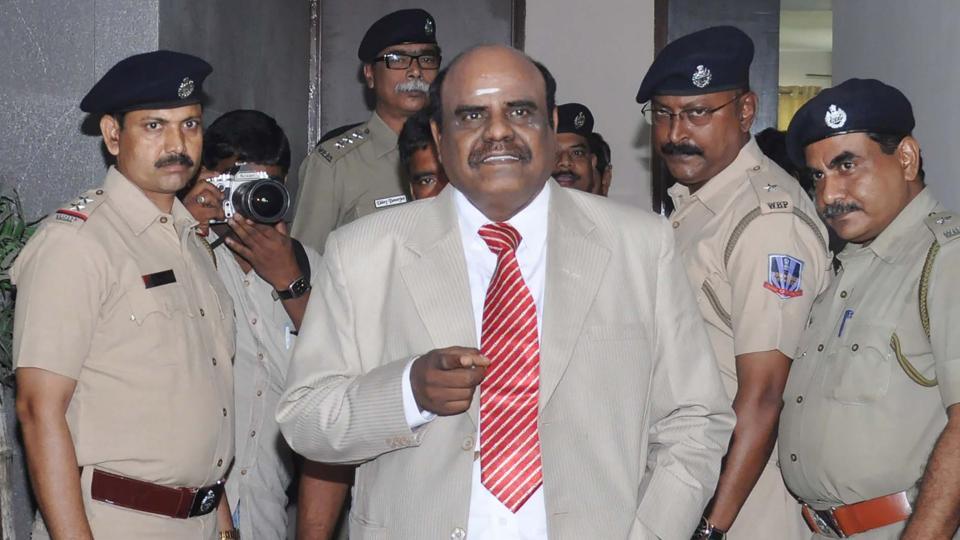A crisis in the court
June 23, 2017 | Expert Insights

A High Court judge, Justice CS Karnan has been sent to jail to serve a six month sentence on charges of contempt of court. This is the first time a judge in India has been convicted and sentenced on those charges.
The case along with the subsequent conviction is completely unprecedented within the Indian judiciary. It is after all the first time in the Indian Supreme Court history when the court has issued a warrant against a sitting High Court judge. The case has also been coloured by allegations of casteism as Justice Karnan claimed that he was being targeted by the judges in the Supreme Court because he is dalit (dalits are members of the “lower” castes in India who have been historically oppressed).
Background
The current controversy began in earnest on January 23, 2017 when Justice Karnan wrote a letter to the Prime Minister of India alleging that there was rampant corruption within the judiciary. While he did not support his claims with evidence, he provided a list of 20 names (as well as the names of 3 senior law officials).
This isn’t the first time he has made such allegations. Back in 2011, he wrote to the National Commission for Scheduled Castes (NCSC) noting that he was being harassed judges in the Madras High Court and that the harassment was due to casteism.
While his earlier actions had not ruffled the powers-be within the Indian judiciary, his latest statement created a furor within the system. By February 8, a seven-judge bench (CJI JS Khehar, Justices Dipak Misra, J Chelameswar, Ranjan Gogoi, M B Lokur, P C Ghose and Kurian Joseph) said that the comments made by Justice Karnan (along with his previous allegations) was contempt of court. The bench demanded an explanation from him but Justice Karnan did not appear in court for his scheduled hearing on February 13. The court rescheduled the hearing for March 10 but when he didn’t show up for that as well, a bailable warrant was issued with an order for the state police to bring him in on March 31.
While he had been barred from performing any judicial functions, Justice Karnan passed an order demanding a case against the seven judges and said that they were discriminating against him based on his caste. By April 2017, he had also passed an order that banned the Chief Justice of India along with six other judges from travelling abroad until the cases lodged against them are disposed.
By now the situation had devolved into chaos with judges in the Supreme Court ordering a panel of doctors to examine the mental well-being of Justice Karnan. He responded with a counter-order demanding that the Supreme Court judges be checked on whether they were of sound mind by a panel of psychiatrists. On May 9, the Supreme Court had sentenced Justice Karnan to serve a six month jail term for contempt of court and the judge went missing in a few days. On June 20, he had been arrested in Tamil Nadu by three teams of West Bengal police.
Analysis
Not the first ‘controversial’ judge
While Justice Karnan is the first High Court judge in India to have been convicted of contempt of court, he is hardly the first judge to have made similar controversial allegations against his peers. DV Shylendra Kumar, a judge in Karnataka High Court wrote an article back in 2009 wherein he called the then-Chief Justice of India, KG Balakrishnan, a “serpent without fangs, who can hiss but not bite.” These statements were made in response to the CJI not making his assets public. Another judge, Justice Markandey Katju, has a history of making controversial remarks. In 2009, in response to a plea by a Muslim student asking to be allowed to sport a beard in his school (which was a convent), Justice Katju denied that plea while also saying that allowing Muslim students to sport beards in India would lead to the “Talibanisation of the country.” In 2015, Justice Devadass ordered that a man who had raped a teenager back in 2008 could leave jail and opt for mediation with the victim. The Madras High Court later recalled the order.
Assessment
The case involving Justice Karnan is nuanced and should be explored dilligently. Our assessment is that it is time to re-look at how the all-powerful judiciary in India is held accountable. The allegations made by Justice Karnan where he levied charges of corruption among his peers was treated as contempt of court. Does that mean judges in the country cannot be accused of corruption or that raising such charges would mean imprisonment? Is the Indian judiciary exempt from any accountability? Should it be?








Comments